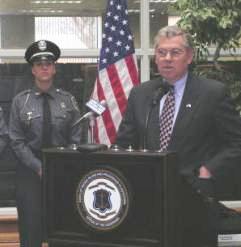Feature:
Rhode
Island
Governor
Vetoes
Medical
Marijuana
Bill
Wednesday
--
Senate
Overrides
Thursday
7/1/05
Rhode Island Gov. Donald Carcieri Wednesday vetoed a medical marijuana bill that had passed both houses of the legislature with overwhelming support. But in a sign of the bill's momentum, the Senate delivered a slap in the face to the governor by overriding his veto late Thursday evening. The bill's sponsors in the House have vowed to do the same, but time is running short. While Carcieri had earlier signaled he would veto the bill, the move came one day after two representatives of the Office of National Drug Control Policy (ONDCP) visited the state to lobby against the measure that would have made Rhode Island the 11th state to enact a medical marijuana law. The measure's "noble goals cannot mask its serious safety flaws," the governor said in his veto message. "Our desire as public servants to be compassionate must be balanced by our obligation to ensure public safety," he said. "The flaws inherent in this bill will place our children at an increased risk of abusing marijuana... [and] give our citizens a false sense of security against criminal prosecution." In language straight out of Harry Anslinger's phrase book, Carcieri described marijuana as an "addictive narcotic." Worse yet, Carcieri said, "nearly anyone" would be able to grow his medicine "in nearly any private location." And the amount of marijuana that sick people could possess was "staggering," the Republican governor said. The bill would protect patients from arrest under Rhode Island law if they have a doctor's recommendation and register with the state. Marijuana could be used to treat the symptoms of certain serious illnesses, including multiple sclerosis and cancer. Under the bill, patients could possess up to 12 plants or 2.5 ounces of marijuana. "As a person living with multiple sclerosis, I'm disappointed and saddened by the governor's veto," said Rhonda O'Donnell, an MS patient who is also a registered nurse. "He should be working to protect seriously ill people, not to subject us to arrest. I hope the legislature will continue to show their humanity and compassion by overriding this veto." It would be a shame to come so close and still be thwarted, said O'Donnell. "There has been so much momentum and support for this bill. We had grassroots support, we had broad public support, and the legislature was listening to its constituents. That's one thing the governor isn't doing," she told DRCNet. "This is disheartening."
"Gov. Carcieri would have us believe we need the Rhode Island state police to arrest cancer patients to save them from the threat of arrest by federal authorities," said Neal Levine, director of state policies for the Marijuana Policy Project in Washington, DC. "His constantly shifting reasoning for vetoing this legislation is downright bizarre. Fortunately, the Rhode Island General Assembly seems to have more compassion than the governor. We are hopeful the legislature will override this veto and protect some of Rhode Island's most vulnerable citizens." While patients and advocates expressed outrage at Carcieri's veto, legislators vowed to do just that, and by Thursday evening the Senate had acted. After passing in the House last week by a margin of 52-10, the votes to override are there in the House as well, if legislators continue to stand firm and the override comes to another vote. "Apparently the governor doesn't want to listen to the House, he doesn't want to listen to the Senate, and he doesn't want to listen to 70% of the people of Rhode Island," said Rep. Thomas Slater (D-Providence), the bill's House sponsor. "He wants to listen to the people that come in from Washington, DC, to push against this bill." Slater was referring to two ONDCP employees, John Horton, assistant deputy director for state and local affairs, and Patrick Royal of the public affairs office, who arrived Monday and spent the next two days urging lawmakers and Carcieri's staff to oppose the bill. Carcieri spokesman Jeff Neal confirmed to the Pawtucket Times that the ONDCP representatives argued that the bill would violate federal law and that the Food and Drug Administration does not consider marijuana to be a safe and effective medicine. While the ONDCP arguments apparently worked on a governor already leaning toward a veto, neither they nor the governor's veto message were changing the minds of the bill's proponents. Those concerns have "all already been answered," said Sen. Rhoda Perry (D-Providence), the bill's Senate sponsor. "I don't think there's one thing in his veto message that would change my mind... and I'm pretty certain it won't change anybody else's mind easily," she said before Thursday override vote. She was right. Carcieri's suggestion that the legalizing medical marijuana would increase teens' access to the herb was "totally wrong," said Perry. Ten other states have similar programs, and an increase in teen marijuana use "just has not happened," she said. Both Slater and Perry told the Pawtucket Times Wednesday they were seeking to schedule a vote to override the veto. Slater said he would ask House Speaker William Murphy to schedule a vote, while Perry walked over to Senate Majority Leader Teresa Paiva-Weed to request a vote as the newspaper's reporter watched. A vote in the House to override is by no means certain, said SSDP's Angell. "We have to ensure that none of the legislators who were visited by the drug czar's people change their votes," he said. "There is also the question of timing. There are a number of issues they'll be working on before the session ends. We have to keep the pressure on the legislature."
| |||||||||||||||||||||||||||||||||||||||||||||||||||||||||||||||||||||||||||||

